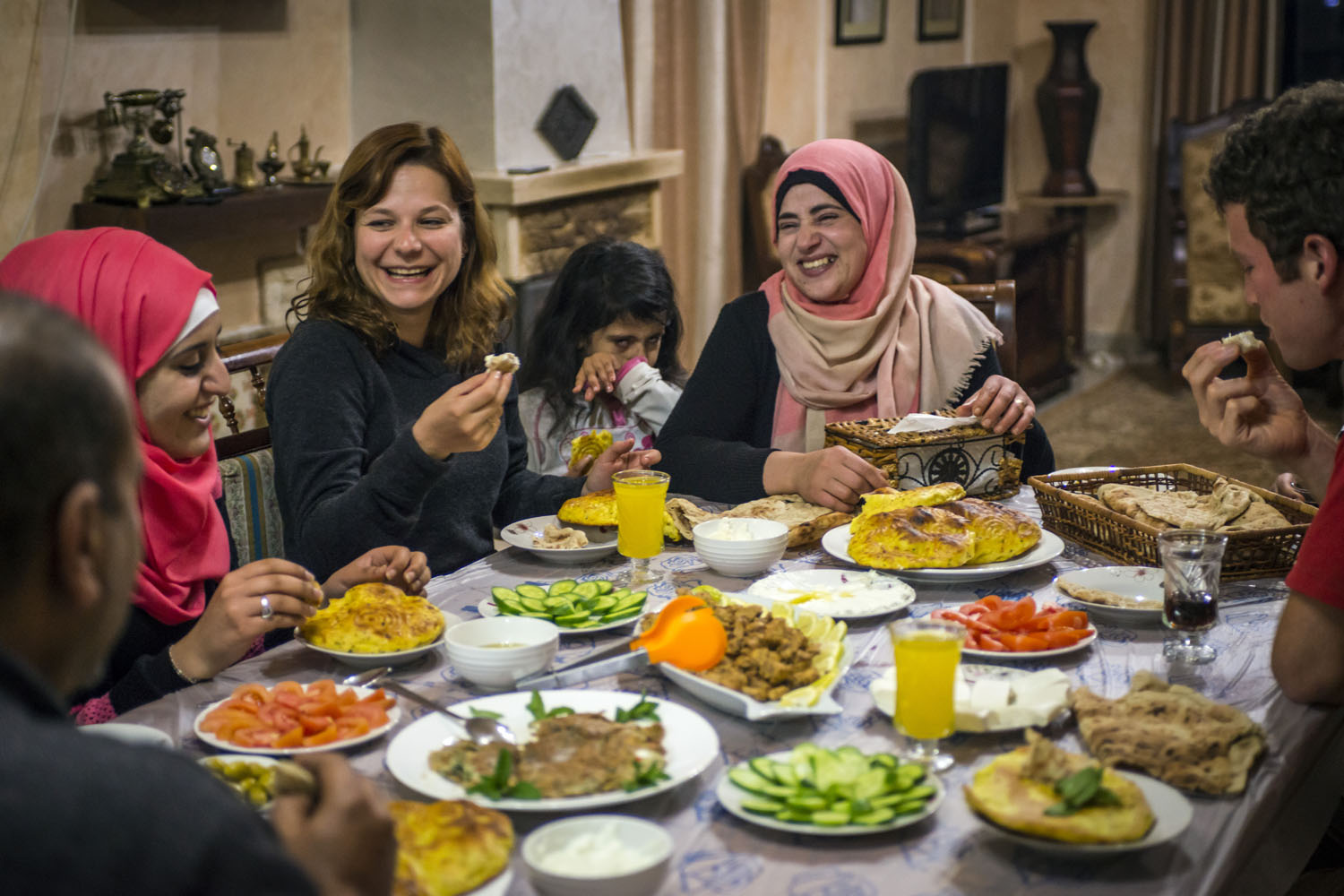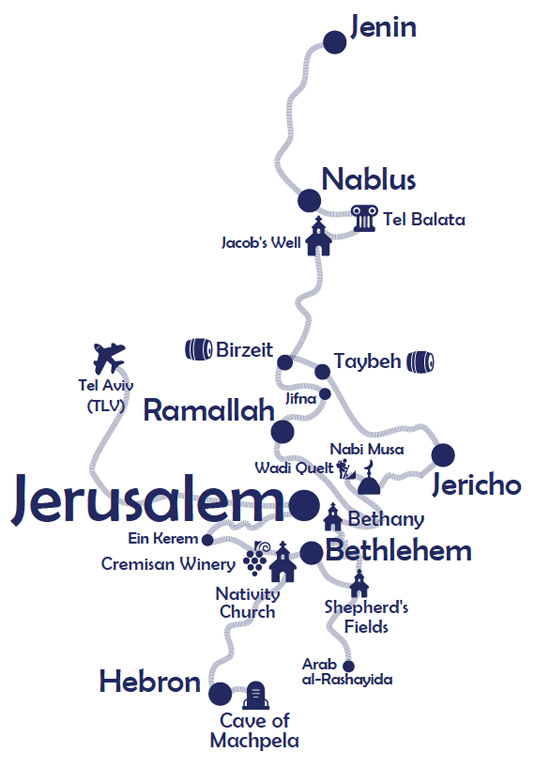About this Tour
Trace the architectural and cultural heritage of Muslim Faith on this 1-week tour from the Jordan River and Jericho to Jerusalem, the Mediterranean and Nazareth.

Itinerary
You can find this itinerary in our Sales Guide on page 34. Download your free copy here.
Arrival to the airport or via land border and direct transfer to Jerusalem. Overnight in Jerusalem.
Start you day with an authentic hearty Jerusalemite breakfast of hummus, ful, falafel, salads, and mint tea at the 1900s family run Abu Shukri restaurant in the Old City. Afterwards, follow your guide to Jerusalem’s different bazaars and indulge yourself in all of the scents they offer, whether it be the spice bazaars or the fresh made brews of Arabic coffee.
Continue for lunch to Bint al-Balad, a women’s cooperative preparing local dishes to visitors before continuing your tour along Jerusalem’s historic and religious monuments.
Overnight in Jerusalem.
Explore the vicinity of Jerusalem on a guided tour: the Mt. of Olives with its biblical landmarks, Ein Kerem, known to be the hometown of John the Baptist (lunch), and eventually Bethlehem, birthplace of Christ with its enchanting churches and busy market streets. For dinner, head to a famous BBQ restaurant, where lamb meat is traditionally cut using a large curved knife and be introduced to the famous mezze, a collection of Arabic salads and appetizers.
Overnight in Bethlehem.
In the early morning, optionally attend the daily mass in the Church of Nativity. After breakfast, visit the Shepherds’ Fields in Beit Sahour before heading to the Cremisan Monastery and Winery for a wine tasting as well as an overview about the history, culture, and difficulties of the clergy and the local Christian neighborhoods.
After a simple but truly Palestinian falafel sandwich for lunch, pass by the Solomon Pools, from which water was drawn in ancient times to Jerusalem, before arriving to Hebron. Visit the Old City and get a taste of daily life. For dinner, enjoy a truly Hebronite dinner, including — upon prior arrangement — camel meat.
Overnight in Bethlehem.
Depart from Bethlehem through Wadi Nar to Bethany and visit the Tomb of Lazarus and the Church dedicated to Mary & Martha. Continue to the Palestinian city of Jifna for a locally family-prepared lunch. In the afternoon, taste Palestinian-brewed beer in either Taybeh or Birzeit, before exploring the bustling city of Ramallah and enjoying its famous Rukab ice-cream made with Arabic gum. For dinner, head to one of Ramallah’s famous bars, often featuring live music.
Overnight in Ramallah.
Depart to Jenin for a visit to a traditional organic farm working to restore and preserve traditional methods of farming. For lunch, you are invited to participate in preparing a traditional meal at Beit al-Karma Women Cooperative in Nablus, followed by a guided tasting tour through the Old City. On your way to Jericho, treat yourself with a traditional Palestinian-style dessert prepared with special semolina dough and goat cheese and drizzled with rosemary flavored syrup.
Overnight in Jericho.
In the morning, explore the oasis of Jericho with is its enchanting orange and dates fields by bike or horse-drawn carriage, followed by a homemade, organic lunch in the city.
In the afternoon, pass by the Islamic shrine Nabi Musa, resting place of Moses by Muslim tradition and enjoy a panoramic view down to Wadi el-Quelt and St. George Monastery.
With sunset, arrive to a traditional Bedouin camp in the Jerusalem Wilderness for a concluding dinner from the earthen zarb oven.
Overnight in the desert.
Check-out and transfer to the airport or land border.
Famous Local Dishes
The following dishes are signature foods of Arabic-Palestinian cuisine and best enjoyed in renowned restaurants or shared with local families.
Musakhan
Chicken cooked on top of round taboun bread, garnished with onions, pine nuts and sumac (a lemony tasting reddish spice)
Maqlubeh
Literally “upside down”: meat cooked in the bottom of a large cooking pot with fried eggplant or cauliflower and seasonings. The pot is then turned over at once bringing the meat and vegetables on top – hence the name.
Mulukhiyya and Bamia
A green leaf which turns glutinous when cooked, and okra. Both vegetables are commonly turned into soups or stews, with or without meat
Qioreh
A classic from the city of Hebron, with chicken or lamb sealed in a pot with rice, butter and seasoning and cooked slowly in a bread oven.
Fokhara
Chicken or lamb and vegetables cooked in a sealed earthenware pot.
Mansaf
A Bedouin dish of lamb cooked in a tangy sauce of yoghurt, served with rice.
Street Food
While en route, make sure to try some of Palestine’s famous street food!
Falafel
These fried rounds of crushed chickpeas, flavored with herbs and spices, are found throughout Palestine. There are slight regional variations — Ramallah falafel tend to be longish ovals, whereas elsewhere they’re usually round or slightly flattened. In Hebron, they often come served with fried potato and/or rounds of fried eggplant, instead of the more usual salads and hummus. However, they’re served, they’re cheap, filling, tasty and a godsend for vegetarians.
Mu’ajanat
Usually sold at bakeries, Mu’ajanat are pastries baked in a wood oven, usually filled with: Za’atar (local thyme), white or yellow cheese or cooked minced meat.
Kebab
There are many variations on the theme of meat on a stick. The stereotypical “shish” or pieces of meat, marinated and grilled, is more commonly found in sit-down restaurants. Street kebabs are more often “seek” kebab — minced meat mixed with herbs and molded around a skewer, served in pita with salads and sauce.
Shwarma
Don’t be fooled by any resemblance to the veal doner kebabs of post-pub Britain; shwarma is more like some good Greek gyros. Usually served in pita bread, the tastier version is offered in shrak, the foot-wide, wafer-thin stretchy bread cooked over a metal griddle, known as saj. Shwarma made with shrak can easily challenge origami with its intricate, neat folds.
Fact Sheet
Kind of Tour
Culinary tour.
Main target group
Food lovers and all travelers ready to indulge themselves into a world full of flavors, spices, and tastes of the Palestinian-Arabic cuisine.
Length of tour
8 days / 7 nights.
Accommodation
Jerusalem, Bethlehem, Ramallah, Jericho.
Accommodation level
Hotels and guesthouses of all categories; homestays with local families, Bedouin camp.
Best time of travel
Year round, especially July to October when many fruits are harvested.
Best weather
Spring and autumn.
Recommended group size
Tour is suitable for any group size; for best experience, groups up to 20 PAX are recommended.
Requirements
None, except a desire for tasty food.
Highlights
- Includes signature dishes and beverages of the Palestinian-Arabic cuisine.
- Includes multiple encounters and meetings on Palestine’s culinary heritage with locals.
- Includes cooking classes.
- Includes a wine-tasting of locally grown Palestinian wine.
- ncludes beer-tasting of Palestinian brewed beers.
Map
Download our free Holy Land map to market this tour to your clients.

